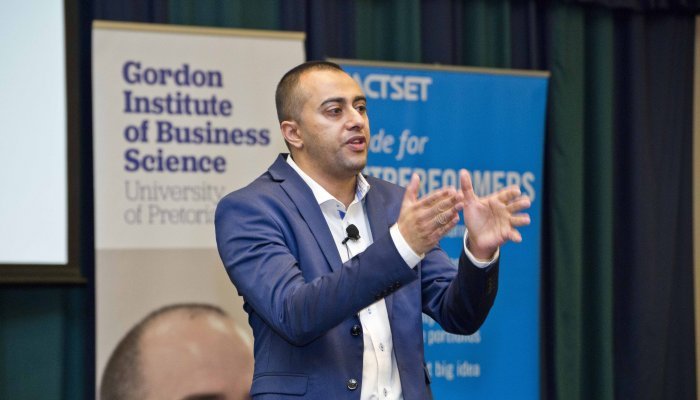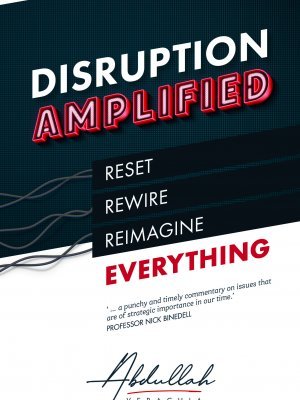Abdullad Verachia is a global speaker, disruptor, strategist, founder and CEO of The Strategist and programme director for the Harvard Senior Executive Programme for Africa at GIBS. He spoke to Acumen’s Aurelia Mbokazi, who began by asking him who the book was for and what he hoped they would take away from it.
Many people kept asking me, ‘When do we get to the new normal?’, which I believe is a misnomer because where we were was not normal to begin with. In some ways, Covid-19 has been a blessing that challenged some of those norms. While none of us have answers, I tried to engage leaders of different sectors, using strategic foresight to paint some scenarios. I wanted this book to appeal not only to that audience but also to a broad base to give everyone a view of what the world might look like beyond Covid-19.
Isn’t Disruption Amplified premature, seeing that the world is still battling with second or third waves of Covid-19?
Volatility, uncertainty, complexity and ambiguity will always be there, so we must build adaptive leadership for this context as suggested by the World Economic Forum. I may not have all the answers, but there are models and tools that we can use to empower ourselves to be proactive and to go on the attack in times of uncertainty. One of these tools is strategic foresight. We can also gear up our workforces to be a lot more fluid, adaptable and agile.
Technology has been a big winner during Covid-19. How prepared is society, especially in South Africa, for technological uptake?
I was involved in a large study with Genesis Analytics, Oxford University and the Bill and Melinda Gates Foundation looking into South Africa in the digital age. We discovered that if we thought about the modalities and allowed access in a digital economy, we could use technology to create jobs. There are many opportunities for job creation in a digital world, but inclusion must be at the heart. Even unskilled labourers can access job opportunities in platforms such as ride-sharing apps to drive and deliver goods.
How people work was one of the major disruptions. You make a strong case for the hybrid workplace, which combines working remotely with access to social interactions. How could this be refined for employers and employees to derive great benefits?
There are billions of people worldwide who spend an average of 90 minutes sitting in gridlocked roads on their daily commute to work. This creates anxiety and reduces productivity because people are tired and frustrated. They repeat this process in the evenings. Covid-19 gave us an opportunity to reimagine what working from home might look like. It also taught us the value, impact and importance of human connections from coming together, meeting, and learning from seeing how leaders behave. I believe we will get to a process where work is not on an eight-to-five traditional five days a week but follows a hybrid process that combines working from home and the office. This includes innovative approaches like hot-desking, which benefits employees.
Retail stores upped their online innovation throughout lockdown. Did South African retailers respond fast enough and adequately to this trend?
Digital businesses are about a seamless, frictionless and easy user experience that simplifies buying on a computer or phone. Most of the retailers I have tested have a complex user experience on their e-commerce platforms. I click five times to get to the exit point when it should be a maximum of two clicks.
They also need to use big data to have a better customer preference. I get recommended stuff I am not interested in by some of the retailers. Had they leveraged my data correctly, they would know my interests.
Also, retailers cannot deliver goods for customers who buy on an e-commerce platform after 7-10 days because humans want instant gratification. If retailers can solve the frictionless ease of use, ensure quick delivery and use data to inform patterns of behaviour, they can outstrip the physical retail experience and make it magical to shop online.
The pandemic’s disruption exposed South Africa’s great inequality in education. As everything moved online, disadvantaged learners, who are in the majority, were left behind. Would a hybrid model of education not widen that inequality gap?
One of the biggest challenges we have as a society is to create affordable and inclusive broadband access, especially in education. It broke my heart to learn that only young people from privileged parts of our society, those with access to broadband and devices, could continue with a digital education during the hard lockdown.
Once we level the playing fields, we need to think about how we use digital platforms to provide the same level of education regardless of one’s location. If we don't, we increase the divide between the haves and the have-nots, which is not fair because it's not a disparity by cognitive ability, but by access to data and devices.
I see a massive opportunity in online education, and we can replicate the model by providing access to opportunity.
Public healthcare struggles to deliver quality healthcare to the country’s majority. As a strategist, how would you advise the Minister of Health on ways to use the disruption to improve public healthcare?
We have an extremely overstretched and overburdened public healthcare that serves more than 80% of the population, while private healthcare is accessible, through medical aid, to only about 17% of the population.
During lockdown, the public and private health sectors benefited from working closely together while sharing beds, ICUs and human resources. They also utilised data analytics and geo-location for better-informed healthcare decisions, which allowed them to look at a specific area and see the major healthcare conditions and then investigate ways of using technology and analytics to create efficiency and make data-driven decisions to manage the allocation of resources.
In the run-up to the introduction of universal healthcare, there needs to be stronger private and public healthcare partnerships.
Hyper-collaborations and cross-border partnerships are solutions that countries can implement post Covid-19. For example, the African Union is implementing the African Continental Free Trade Area (ACFTA). How could economies that were battered before Covid-19 benefit from these partnerships?
Smaller countries will be deeply affected because they place a much greater emphasis on the short-term reality of building up their own resources instead of focusing on multilateralism and ways to collaborate.
SADC is a collective market of 15 countries and almost 270 million people with South Africa playing a key role in this regional grouping. We must start to position SADC as the gateway and an opportunity to reach 270 million people, as opposed to individual markets. We do this by growing market dynamics for investment flows and collective buying, and then change the value proposition to that of a collective market of 15 countries. We must make this attractive through easier borders, trade regulations and simpler negotiation access, similar to the East African Community, the EU and the ASEAN region.






